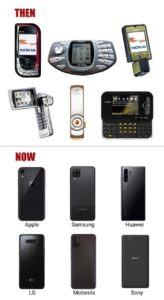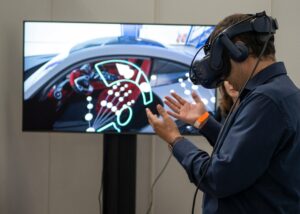Inventive AIs, Dominant Design, Metaverse, Use Case Protection, AI generated characters: 🎯 IP Management Pulse #4
Many IP experts in the IP community at I3PM, the HTB-EPO initiative, and other global IP offices and institutions in national and regional innovation systems have asked Prof. Alexander Wurzer: “where can you be sure not to miss any important IP management content”. In fact, you have to follow a number of interesting feeds to really keep up with the global developments around IP management. To make this easier he decided to offer his own personal newsletter for IP management. Here you can find the last issues in the archive and also subscribe. A fresh read with all the important IP Management content will be sent to the subscribers every second Thursday at 7.00 (CET), so you can start your day informed.
The next Newsletter will cover the following topics:
AI makes groundbreaking discoveries
 Can AI create new knowledge, can AI really be creative 🤔? AI has discovered the first new antibiotic in 60 years 😮!
Can AI create new knowledge, can AI really be creative 🤔? AI has discovered the first new antibiotic in 60 years 😮!
The question that I discuss almost daily with IP experts from the industry is: 𝐂𝐚𝐧 𝐀𝐈 𝐫𝐞𝐚𝐥𝐥𝐲 𝐢𝐧𝐯𝐞𝐧𝐭? Or does AI just reproduce, more or less meaninglessly, what was already in the training data anyway🧐?
Well: Multi-resistant bacteria have been a major challenge for medicine for many years and cause millions(!) of deaths in clinical practice every year. The World Health Organization (WHO) classifies antibiotic resistance as one of the biggest medical problems of our time.
𝐓𝐡𝐞 𝐮𝐬𝐞 𝐨𝐟 𝐀𝐈 𝐢𝐬 𝐩𝐫𝐨𝐯𝐢𝐧𝐠 𝐭𝐨 𝐛𝐞 𝐠𝐫𝐨𝐮𝐧𝐝𝐛𝐫𝐞𝐚𝐤𝐢𝐧𝐠 𝐢𝐧 𝐦𝐞𝐝𝐢𝐜𝐢𝐧𝐞 – perhaps the turning point in the fight against antibiotic resistance – but this comes too late for almost 1.3 million deaths from multi-resistant germs in 2019 alone. The MIT project published in Nature used “transparent” AI to see how the AI learns from the models to derive predictions for certain good molecules against antibiotics.
A deep learning model 🤖 was used to automatically predict the activity and toxicity of each compound. 𝐀 𝐭𝐨𝐭𝐚𝐥 𝐨𝐟 𝟏𝟐 𝐦𝐢𝐥𝐥𝐢𝐨𝐧 (!) 𝐜𝐨𝐦𝐩𝐨𝐮𝐧𝐝𝐬 𝐰𝐞𝐫𝐞 𝐞𝐱𝐚𝐦𝐢𝐧𝐞𝐝 – this is almost impossible with classic laboratory work 🚀.
You gradually have to ask the initial question differently: 📢 𝐖𝐡𝐨 𝐚𝐜𝐭𝐮𝐚𝐥𝐥𝐲 𝐬𝐭𝐢𝐥𝐥 𝐛𝐞𝐥𝐢𝐞𝐯𝐞𝐬 𝐭𝐡𝐚𝐭 𝐭𝐡𝐞𝐲 𝐜𝐚𝐧 𝐛𝐞 𝐬𝐮𝐜𝐜𝐞𝐬𝐬𝐟𝐮𝐥 𝐢𝐧 𝐭𝐡𝐞 𝐢𝐧𝐧𝐨𝐯𝐚𝐭𝐢𝐨𝐧 𝐜𝐨𝐦𝐩𝐞𝐭𝐢𝐭𝐢𝐨𝐧 𝐰𝐢𝐭𝐡𝐨𝐮𝐭 𝐀𝐈 𝐬𝐮𝐩𝐩𝐨𝐫𝐭? 𝐀𝐝𝐚𝐩𝐭 𝐲𝐨𝐮𝐫 𝐈𝐏 𝐦𝐚𝐧𝐚𝐠𝐞𝐦𝐞𝐧𝐭 𝐭𝐨 𝐭𝐡𝐞 𝐀𝐈 𝐞𝐫𝐚 – 𝐚𝐬 𝐪𝐮𝐢𝐜𝐤𝐥𝐲 𝐚𝐬 𝐩𝐨𝐬𝐬𝐢𝐛𝐥𝐞.
Protecting Dominant design with IP
 What is a “𝐃𝐨𝐦𝐢𝐧𝐚𝐧𝐭 𝐃𝐞𝐬𝐢𝐠𝐧” and why is it so important for IP 🤔? Because for an IP strategy you have to know what the competition actually is 🧐!
What is a “𝐃𝐨𝐦𝐢𝐧𝐚𝐧𝐭 𝐃𝐞𝐬𝐢𝐠𝐧” and why is it so important for IP 🤔? Because for an IP strategy you have to know what the competition actually is 🧐!
Dominant design is a concept in technology management introduced by James M. Utterback and William J. Abernathy in 1975. It identifies key technologies that will become the de facto standard. A dominant design is the one that wins market approval and that competitors and innovators must adhere to if they want to achieve significant market presence.
Just like you see with smart phones 👇. Once the dominant design has established itself, the competition changes. In this context, “design” should not be understood as the design of the outer shell of a physical product. Rather, design means the entire product logic.
When a new technology emerges (e.g., GUI operating systems for computers), companies often introduce a number of alternative designs (e.g., Microsoft – Windows, Apple Inc. – Mac OS, and IBM – OS/2). Updated themes are released that include incremental improvements. At some point an architecture may emerge that is accepted as an industry standard, such as Microsoft Windows.
When the dominant design is established in the market, competition shifts. With smart phones, from the hardware to the software and the apps. In operating systems, from proprietary solutions to interoperability.
📢 𝐖𝐡𝐞𝐧 𝐝𝐞𝐬𝐢𝐠𝐧𝐢𝐧𝐠 𝐈𝐏 𝐬𝐭𝐫𝐚𝐭𝐞𝐠𝐢𝐞𝐬, 𝐲𝐨𝐮 𝐬𝐡𝐨𝐮𝐥𝐝 𝐤𝐧𝐨𝐰 𝐰𝐡𝐚𝐭 𝐭𝐡𝐞 𝐜𝐨𝐦𝐩𝐞𝐭𝐢𝐭𝐢𝐨𝐧 𝐢𝐬, 𝐨𝐭𝐡𝐞𝐫𝐰𝐢𝐬𝐞 𝐲𝐨𝐮 𝐜𝐚𝐧𝐧𝐨𝐭 𝐦𝐚𝐤𝐞 𝐭𝐡𝐞 𝐈𝐏 𝐜𝐨𝐦𝐩𝐞𝐭𝐢𝐭𝐢𝐯𝐞 𝐢𝐧𝐬𝐭𝐫𝐮𝐦𝐞𝐧𝐭 𝐞𝐟𝐟𝐞𝐜𝐭𝐢𝐯𝐞.
If I talk to a chatbot – what does it actually look like 🤔? Sure: On Instagram he looks like Emily Pellegrini, 21, Italian and an AI 😮!
Three trends are currently converging: exerywhere, always and persuasive
1️⃣ 𝐄𝐯𝐞𝐫𝐲𝐰𝐡𝐞𝐫𝐞: At the largest electronics trade fair in the world, the Consumer Electronics Show, or CES, it becomes clear: AI dominates and disappears and seeps into everything: cars, robots, toothbrushes, refrigerators …
2️⃣ 𝐀𝐥𝐰𝐚𝐲𝐬: At the same time, we are getting more and more used to interacting with AI-based chatbots on a daily basis, from ChatGPT to Google’s Bard, Amazon’s Alexa to “Frag Magenta” from Deutsche Telekom or “Ada” from the Swiss AXA Insurance.
3️⃣ 𝐏𝐞𝐫𝐬𝐮𝐚𝐬𝐢𝐯𝐞: After all, AIs now produce such convincing representations of people – see Emily – that it is difficult for us to distinguish any difference from reality. Especially when reality – such as fashion, music, film, gaming or influencers – already seems quite “artificial/artistic”.
The economic size of these markets is gigantic and growing massively worldwide. The market for influencer advertising alone is increasing by 10+% annually and will soon reach almost €50 billion worldwide. With such AI-generated characters and personalities come a whole range of exciting IP questions:
📌 What is the difference between AI personalities and deepfakes or media manipulation?
📌 What legal implications do such AI-generated personalities have on the modeling, music and influencer industries?
📌 What role do service providers like Scenario play in the creation of AI personalities? Where do copyright and trademark rights apply?
📌How to deal with the potential misuse of AI for explicit content?
What is next for the metaverse?
 How real is the Metaverse 🤔? It depends on who you ask: It will probably first catch on in industry and then in the consumer sector 🤗. And that has IP consequences 😮!
How real is the Metaverse 🤔? It depends on who you ask: It will probably first catch on in industry and then in the consumer sector 🤗. And that has IP consequences 😮!
According to all the information that is currently available and the impressions from CES 2024: The Metaverse is coming – but differently than many thought. Siemens is determined to lead the “𝐈𝐧𝐝𝐮𝐬𝐭𝐫𝐢𝐚𝐥 𝐌𝐞𝐭𝐚𝐯𝐞𝐫𝐬𝐞” Here is an overview of what was important at CES2024 and what the industrial metaverse could look like.
The World Economic Forum shows that by 2030 over 700 cities will have their own metaverse. 𝐓𝐡𝐫𝐞𝐞 𝐜𝐢𝐭𝐢𝐞𝐬 𝐚𝐥𝐫𝐞𝐚𝐝𝐲 𝐡𝐚𝐯𝐞 𝐚 𝐦𝐞𝐭𝐚𝐯𝐞𝐫𝐬𝐞: Seoul – South Korea, Santa Monica – United States and Dubai – United Arab Emirates.
The most important topics of AR/VR for 2024 are:
📌 𝐕𝐢𝐫𝐭𝐮𝐚𝐥 𝐭𝐫𝐚𝐢𝐧𝐢𝐧𝐠: Walmart trains its workforce, and the MindPort GmbH no-code platform can be used to create training courses for business users
📌 𝐒𝐩𝐚𝐭𝐢𝐚𝐥/𝐈𝐦𝐦𝐞𝐫𝐬𝐢𝐯𝐞 𝐂𝐨𝐦𝐦𝐞𝐫𝐜𝐞: Amazon and Alibaba Group are building 3D marketplaces and shopping experiences including virtual fitting
📌 𝐇𝐚𝐫𝐝𝐰𝐚𝐫𝐞 𝐢𝐧𝐧𝐨𝐯𝐚𝐭𝐢𝐨𝐧𝐬: Apple’s Vision Pro is already sold out for February – sales of 74 million VR glasses are expected for 2024
📌 𝐒𝐨𝐜𝐢𝐚𝐥 𝐕𝐑/𝐄𝐧𝐭𝐞𝐫𝐭𝐚𝐢𝐧𝐦𝐞𝐧𝐭: Epic Games will show its version of the Metaverse and Microsoft is in the starting blocks with Activision Blizzard
📌 𝐕𝐑 𝐢𝐧 𝐦𝐞𝐝𝐢𝐜𝐢𝐧𝐞 𝐚𝐧𝐝 𝐭𝐡𝐞𝐫𝐚𝐩𝐲: This is where most of the training and development takes place in the Metaverse
📌 𝐈𝐧𝐭𝐞𝐫𝐨𝐩𝐞𝐫𝐚𝐛𝐢𝐥𝐢𝐭𝐲 𝐚𝐧𝐝 𝐬𝐮𝐩𝐩𝐨𝐫𝐭𝐢𝐧𝐠 𝐭𝐨𝐨𝐥𝐬: This development comes primarily from the automotive industry, where there is great interest in cross-metaverse interoperability
The Metaverse is largely uncharted territory today – but that doesn’t mean that you can’t and shouldn’t stake out your territory there with IP NOW – no one will wait for the individual. 📢 𝐈𝐧 𝐭𝐡𝐞 𝐦𝐞𝐭𝐚𝐯𝐞𝐫𝐬𝐞 – 𝐬𝐢𝐦𝐢𝐥𝐚𝐫 𝐭𝐨 𝐭𝐡𝐞 𝐈𝐧𝐭𝐞𝐫𝐧𝐞𝐭 𝐚𝐧𝐝 𝐭𝐡𝐞𝐧 𝐭𝐡𝐞 𝐦𝐨𝐛𝐢𝐥𝐞 𝐈𝐧𝐭𝐞𝐫𝐧𝐞𝐭 – 𝐛𝐮𝐬𝐢𝐧𝐞𝐬𝐬 𝐢𝐬 𝐫𝐞𝐝𝐢𝐬𝐭𝐫𝐢𝐛𝐮𝐭𝐞𝐝 – 𝐰𝐨𝐫𝐥𝐝𝐰𝐢𝐝𝐞 – 𝐈𝐏 𝐭𝐨𝐝𝐚𝐲 𝐬𝐞𝐜𝐮𝐫𝐞𝐬 𝐨𝐩𝐭𝐢𝐨𝐧𝐬 𝐟𝐨𝐫 𝐭𝐨𝐦𝐨𝐫𝐫𝐨𝐰.
Patent protection of streaming use cases
Why do we have to watch advertising on Amazon streaming soon 🤔? Well: Among other things, because Tencent has such a good IP strategy with Mirriad for AI-based product placement 😮!
From January 29th, Amazon Prime Video will begin to interrupt films and series in streaming with advertising. Unless you are willing to pay an extra fee per month. 𝐈𝐭 𝐰𝐢𝐥𝐥 𝐜𝐨𝐬𝐭 𝐔𝐒$𝟐.𝟗𝟗 𝐢𝐧 𝐭𝐡𝐞 𝐔𝐒 𝐭𝐨 𝐧𝐨𝐭 𝐬𝐞𝐞 𝐚𝐧𝐲 𝐚𝐝𝐬. Since Amazon already knows very well about users and their purchasing behavior, it is expected that Amazon will generate additional sales of around US💲5 billion from individualized advertising .
The question is: Why does Amazon make this so clumsy? Why not a much more elegant product placement? Quite simply: Because Tencent and Mirriad have patented it. Tencent owns the media platform WeChat and integrates advertising messages seamlessly and imperceptibly into the stream of existing (old) films with AI.
This works excellently 😲, influences the viewers’ purchasing behavior and is not annoying – it’s just that it is 𝐡𝐞𝐚𝐯𝐢𝐥𝐲 𝐩𝐚𝐭𝐞𝐧𝐭𝐞𝐝 𝐛𝐲 𝐌𝐢𝐫𝐫𝐢𝐚𝐝 and is therefore currently not available for Amazon. Hence the clumsy advertising on Amazon from January 29th.
📢 𝐀𝐧𝐲𝐨𝐧𝐞 𝐰𝐡𝐨 𝐦𝐚𝐧𝐚𝐠𝐞𝐬 𝐭𝐨 𝐜𝐫𝐞𝐚𝐭𝐞 𝐚 𝐜𝐨𝐧𝐯𝐢𝐧𝐜𝐢𝐧𝐠 𝐮𝐬𝐞𝐫 𝐞𝐱𝐩𝐞𝐫𝐢𝐞𝐧𝐜𝐞 𝐢𝐧 𝐭𝐡𝐞𝐢𝐫 𝐛𝐮𝐬𝐢𝐧𝐞𝐬𝐬 𝐦𝐨𝐝𝐞𝐥 𝐬𝐡𝐨𝐮𝐥𝐝 𝐚𝐥𝐬𝐨 𝐩𝐚𝐭𝐞𝐧𝐭 𝐢𝐭 in order to make life difficult for the competition and make their business model more difficult.





